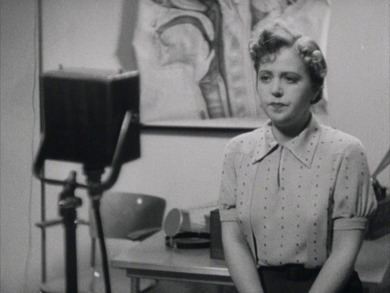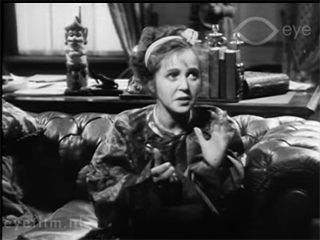Dutch Treat
It took years for George Bernard Shaw to become a successful playwright in London. In fact, before he was big in his own country, he found popular audiences in America and in the German-speaking world, the latter due to the indefatigable efforts of his translator Siegfried Trebitsch. This helps explain why the premiere of perhaps his most popular play, Pygmalion, took place in Vienna in 1913.
It's probably not his best play, or his deepest, but Pygmalion may have the most delightful plot, so it was a natural for the movies once sound came in. And the 1938 British version, with Shaw helping in the screenplay, is generally thought to be the most successful translation of his work to film. But even before it was made, there was a German Pygmalion movie in 1935 and one from the Netherlands in 1937.
I've always been curious to see either one. I don't know if the German film is available, but I was thrilled to discover the version from the Netherlands on YouTube. It has English subtitles, thank goodness.
It's fascinating to see what they do with the story. The action is set in the present (1937, that is) and in the Netherlands, though I don't know how all that stuff with accents and dialects, found in the original, plays in another language. They follow Shaw's plot, for the most part--indeed, if the subtitles are accurate, in many scenes it's line for line. But they fill in action only suggested in the play. The British version would do this as well, and that film helped lead to My Fair Lady, since the original play is missing lots of big moments (there are no speech lessons, for instance, and no embassy ball).
Thus in the 1937 film we see Liza at home deciding to visit Higgins. We see Liza shopping for new clothes and meeting children who know her from the old days. And we certainly get a lot of elocution lessons.
More novel, we see Alfred Doolittle (I'm using the names from Shaw's play--they're spelled differently in the foreign film) actually giving a lecture. In the play and the movie and the musical, Higgins suggests that Doolittle should speak on moral topics and we see how it changes him, but we don't see any lectures.
There's also a scene, found no place else, where Liza leaves Higgins and goes to his mother's place. In the play, Higgins goes to his mother's to tell her Liza is missing, and is surprised to see her there. In the Netherlands' version, we not only see Liza get there first, but we have Mrs. Higgins sit her down and tell her the story of Pygmalion, though the myth is never mentioned in the play.
On the other hand, they pretty much drop poor Freddy Eynsford-Hill. In the play he's charmed by Liza when he sees her the first time she mingles in society. He's so impressed he moons about outside Higgins' place, even in the play. In the British movie, we see more of him. In the musical, yet more (he gets his own song). But in the 1937 movie, once he's been impressed by Liza, the plot drops him.
This may be because the Netherlands' version is a bit stronger on the romance between Higgins and Liza. Shaw had written an anti-romance romantic comedy. He thought it absurd that the two would fall in love, and for the rest of his life insisted they would never end up together. But from the earliest theatrical productions the actors tried to suggest a romance, despite their lines. In the 1938 film, the producer essentially put one over on Shaw and ended his movie with the two reunited. (Shaw, in the final published version of the play, incorporated much of what was added in the British film, but ends with several pages of prose describing Liza's life after the story is over, and it's definitely not a courtship with Higgins. The musical, of course, adopted the 1938 movie ending.)
If anything, the Netherlands version is even worse. Higgins and Liza have their showdown, just as in Shaw. But then Liza accompanies Mrs. Higgins and Pickering to Alfred Doolittle's wedding (a scene not in the play or any other version). And what should happen next but Higgins rushes in and proposes to Lisa. Shaw hated it, but romantic comedy has its own logic, and the film was a major hit.




0 Comments:
Post a Comment
<< Home